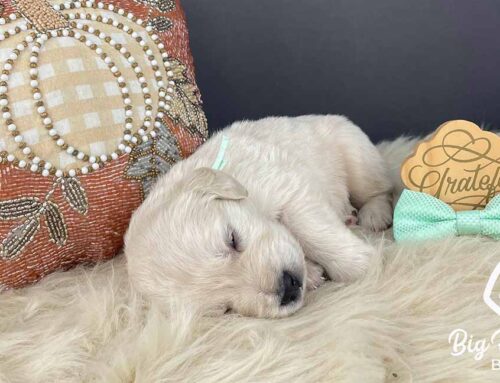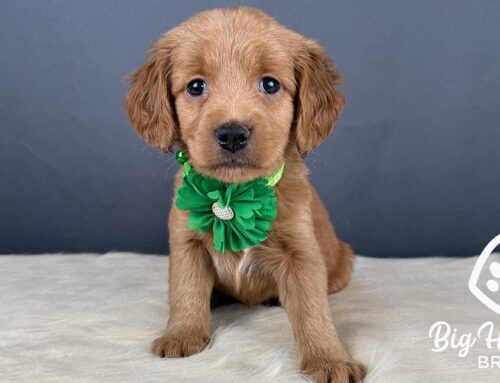Socialization: Why It’s Important and How to Do It
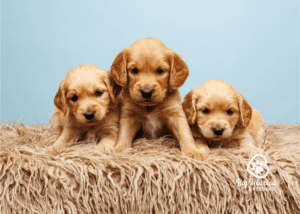 As a breeder, one of my top priorities is ensuring that each Mini Golden Retriever puppy that leaves my care is well-prepared to thrive in their new home. A significant part of that preparation involves early and consistent socialization. Whether you’re welcoming a new puppy or adopting an older dog, understanding the importance of socialization and knowing how to do it properly is crucial for raising a well-adjusted, happy Mini Golden Retriever.
As a breeder, one of my top priorities is ensuring that each Mini Golden Retriever puppy that leaves my care is well-prepared to thrive in their new home. A significant part of that preparation involves early and consistent socialization. Whether you’re welcoming a new puppy or adopting an older dog, understanding the importance of socialization and knowing how to do it properly is crucial for raising a well-adjusted, happy Mini Golden Retriever.Why Is Socialization Important for Mini Golden Retrievers?
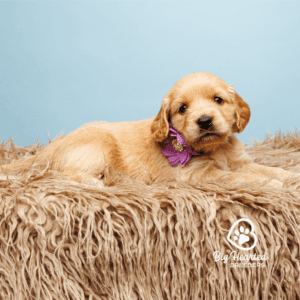 Socialization is more than just exposing your Mini Golden Retriever to new environments—it’s about shaping their ability to adapt, respond, and interact positively with the world around them. Without proper socialization, dogs can become anxious, fearful, or even aggressive in unfamiliar situations. This is particularly important for Mini Golden Retrievers, a breed known for their friendly and affectionate nature. However, even the most naturally sociable dog needs guidance to ensure their temperament is nurtured properly.
Socialization is more than just exposing your Mini Golden Retriever to new environments—it’s about shaping their ability to adapt, respond, and interact positively with the world around them. Without proper socialization, dogs can become anxious, fearful, or even aggressive in unfamiliar situations. This is particularly important for Mini Golden Retrievers, a breed known for their friendly and affectionate nature. However, even the most naturally sociable dog needs guidance to ensure their temperament is nurtured properly.When Mini Golden Retrievers are well-socialized, they are more confident and resilient. They can handle new experiences without becoming stressed, making them a joy to have in any setting—whether at home, visiting the vet, or out in public. As a breeder, I’ve seen firsthand the difference that good socialization makes in the long-term happiness and well-being of these dogs.
Socializing a Mini Golden Retriever Puppy
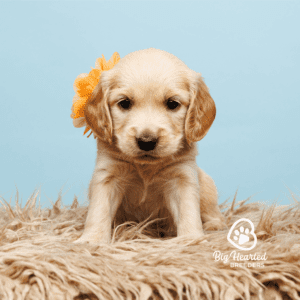 In my breeding program, socialization begins as early as possible. The period between 3 to 14 weeks is a critical window when puppies are most open to new experiences. Here’s how I approach socializing Mini Golden Retriever puppies and what you can do to continue this important work at home:
In my breeding program, socialization begins as early as possible. The period between 3 to 14 weeks is a critical window when puppies are most open to new experiences. Here’s how I approach socializing Mini Golden Retriever puppies and what you can do to continue this important work at home:1. Early Exposure to New Experiences:
From a young age, I expose puppies to a variety of sights, sounds, and surfaces. This includes everything from different types of flooring to household noises like the vacuum or TV. The goal is to help them feel comfortable with the everyday sounds and textures they’ll encounter in their new homes.
 2. Interaction with People and Animals:
2. Interaction with People and Animals:
Puppies in my care meet a wide range of people—adults, children, men, women—so they learn to be comfortable around different types of individuals. They also spend time with their littermates and, when appropriate, other friendly dogs. This teaches them valuable social cues and helps them develop good canine manners.
3. Positive Associations:
Each new experience is paired with positive reinforcement. Whether it’s a gentle pet, a tasty treat, or a fun play session, I ensure that puppies associate new experiences with something enjoyable. This helps them develop a positive outlook on new and unfamiliar situations.
 4. Handling and Grooming:
4. Handling and Grooming:
Regular handling is essential, so I make sure to touch the puppies’ paws, ears, and mouths frequently. This early exposure makes vet visits and grooming sessions much easier and less stressful for them as they grow.
5. Continued Socialization at Home:
When you bring your Mini Golden Retriever puppy home, it’s important to continue this socialization. Take them to new places, introduce them to different people and animals, and always make these experiences positive. Remember, socialization isn’t just about exposure—it’s about ensuring those experiences are positive and build your puppy’s confidence.
Socializing an Adult Mini Golden Retriever
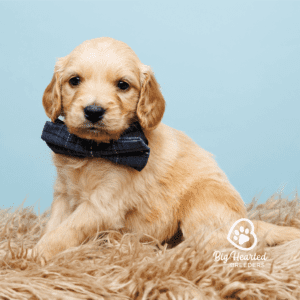 If you’re bringing home an adult Mini Golden Retriever, socialization is just as important, though the approach may differ slightly. Adult dogs may come with their own set of experiences—some good, some challenging—and it’s important to proceed with care and patience.
If you’re bringing home an adult Mini Golden Retriever, socialization is just as important, though the approach may differ slightly. Adult dogs may come with their own set of experiences—some good, some challenging—and it’s important to proceed with care and patience.1. Gradual Introductions:
With an adult Mini Golden Retriever, start with gradual introductions to new environments, people, and other animals. Pay attention to their body language and comfort levels. If they seem nervous, take a step back and allow them to adjust at their own pace.
2. Reinforce Positive Behavior:
Just like with puppies, positive reinforcement is key. Praise and reward your dog when they respond calmly to new situations. This reinforcement helps them associate new experiences with positive outcomes, building their confidence over time.
 3. Training and Structure:
3. Training and Structure:
Adult dogs often benefit from basic obedience training, which can help them feel more secure and responsive to your guidance. Commands like “sit,” “stay,” and “leave it” provide structure and can be particularly useful when introducing them to new situations.
4. Controlled Socialization:
If your adult Mini Golden Retriever is unsure around other dogs or people, start with controlled, one-on-one interactions. For example, introduce them to one calm, friendly dog rather than a group. Keep the sessions short and positive, gradually increasing the level of exposure as your dog becomes more comfortable.
 5. Consistency Is Key:
5. Consistency Is Key:
Maintaining a consistent routine can help your adult dog feel more secure, which is crucial for effective socialization. Regular walks, playtimes, and feeding schedules create a sense of stability, making it easier for your dog to handle new experiences.
6. Professional Support:
If your adult dog shows signs of anxiety or aggression, it may be helpful to work with a professional dog trainer or behaviorist. They can provide you with tailored strategies to help your dog overcome any socialization challenges.
The Impact of Early Socialization
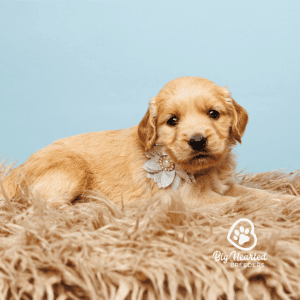 Over the years, I’ve seen how early and consistent socialization can transform a Mini Golden Retriever. One of my favorite stories involves a puppy named Max. From the start, Max was a little hesitant about new experiences. He was curious but cautious, especially around new people. I made sure to expose him to a variety of situations, always pairing these experiences with positive reinforcement.
Over the years, I’ve seen how early and consistent socialization can transform a Mini Golden Retriever. One of my favorite stories involves a puppy named Max. From the start, Max was a little hesitant about new experiences. He was curious but cautious, especially around new people. I made sure to expose him to a variety of situations, always pairing these experiences with positive reinforcement.When Max went to his new home, his owners continued the socialization process. They took him to puppy classes, introduced him to different environments, and always made sure he felt safe and supported. Max quickly blossomed into a confident, friendly dog who was a joy to be around.
Watching Max’s transformation reminded me of how important it is for breeders and owners to work together in the socialization process. It’s not just about the early weeks—it’s about continuing that effort throughout the dog’s life.
Socialization Is a Lifelong Commitment
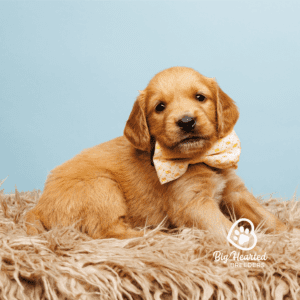 Socializing your Mini Golden Retriever is an ongoing process, one that requires commitment, patience, and a lot of love. Whether you’re starting with a young puppy or an adult dog, the key is to create positive, confidence-building experiences that will help your dog navigate the world with ease.
Socializing your Mini Golden Retriever is an ongoing process, one that requires commitment, patience, and a lot of love. Whether you’re starting with a young puppy or an adult dog, the key is to create positive, confidence-building experiences that will help your dog navigate the world with ease.As a breeder, I always emphasize to new owners the importance of continuing the socialization work we start here. It’s a vital part of ensuring that your Mini Golden Retriever grows up to be a well-adjusted, happy member of your family.
For help with socialization and training, it can be a good idea to talk with and learn from professionals. I recommend Baxter and Bella‘s online training program. You can save 25% with code: BIGHEARTED25.
If you’re a new owner, have you started socializing your Mini Golden Retriever? What challenges and successes have you experienced so far? Sharing your journey can be incredibly helpful for others who are just beginning this important process!

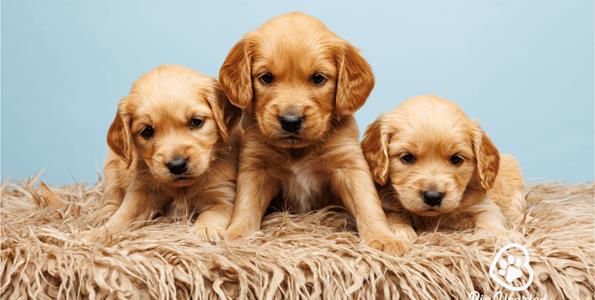
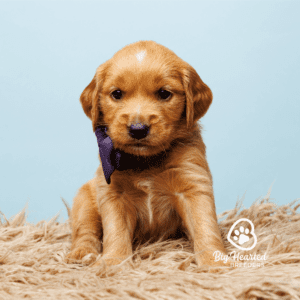 2. Interaction with People and Animals:
2. Interaction with People and Animals: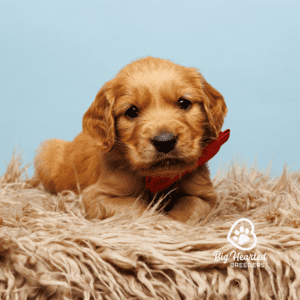 4. Handling and Grooming:
4. Handling and Grooming: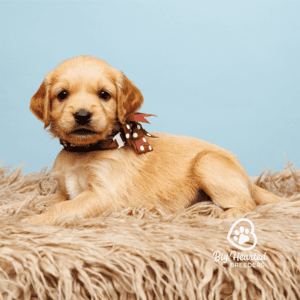 3. Training and Structure:
3. Training and Structure: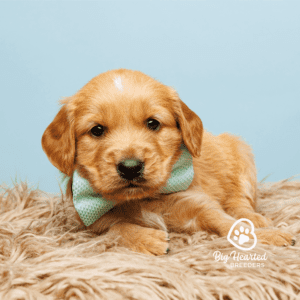 5. Consistency Is Key:
5. Consistency Is Key:
